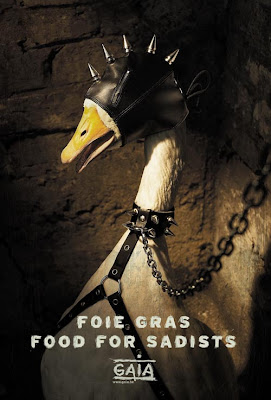And it is delicious. Fatty. Creamy. Salty. Succulent. Delicious.
The first time I tasted it was last May, when I performed a destination wedding in Paris for two friends. They were married in a small garden outside of an art gallery, which afterward held the "reception" - a private meal of French cuisine. Here are some pictures from the wedding and dinner:
 |
| This should be on a postcard |
 |
| Me looking very pastoral |
 |
| The "reception" |
 |
| Our menu for the dinner |
There is no doubt that foie gras is one of the finest foods I've ever eaten (at one of the finest meals I've ever had). But there has always been a debate over how this delicacy is produced. As recently as last week, I heard a story on NPR about the controversy, rekindled by the approaching effective date of a ban on foie gras in California.
Culinary critics and animal rights activists have squared off, and both the foodies and the vegans spit some pretty nasty rhetoric towards each other. Meanwhile, I feel assaulted from both sides.
I'm conflicted.
On the one hand, foie gras is so ridiculously delicious. Sure, it's a gamble to eat it. You never know whether or not you'll clog that last 74% of open artery when you eat it. But even if you did keel over in a cholesterol-induced cardiac arrest, it would be worth it. Foie gras is that good. Plus, in the end, it's just food.
On the other hand, I think that animals should be treated humanely. Unnecessary suffering should not be inflicted on any being, human or otherwise. But I'm not one of those people who curls up in a ball on the floor and sobs uncontrollably anytime I hear Sarah McLachlan's Angel from the ASPCA commercial.


I love the food, but I hate what happens in the production.
But why is it this issue that bothers me? There are a myriad of ways that I enjoy the benefits produced through the suffering of others, and many of those relate specifically to the production of food (non-fair trade foods, for instance).
I suppose this just exposes my larger hypocrisy. I affirm the sacred nature of Creation, and yet I enjoy this food which is produced through unjust, irresponsible, and cruel means. As much as I claim that food is a justice issue, I still want inexpensive tomatoes from Publix (harvested by unfairly-paid exploited farmworkers), just like I want to be able to eat foie gras.
In the end, I don't know if legislation is the answer. Neither do I know if it will be enough for those of us who feel strongly about food justice to (not) put our money where our mouth is(n't) - that is, to let our buying habits reflect our values.
Because ultimately, it's not just food...at least not until we consider food production as an issue of justice. "Blessed are those who hunger and thirst for justice, for they shall be filled." (Matt 5:6)


No comments:
Post a Comment